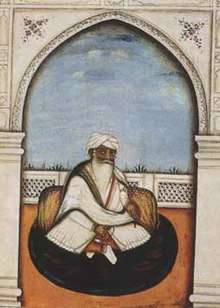Sham Singh Atariwala
Sham Singh Attariwala (1790 - 1846) was a general of the Sikh Empire. He was born in the 1790s in the house of well known Sikh farmers in the town of Attari (a few kilometres from the border of Indian and Pakistan Punjab in India), Amritsar, in the Majha region of Panjab, India. As a child he was educated in Gurmukhi and Persian. When Ranjit singh became the Maharaja of Punjab, he got Attariwala's services at his disposal. Maharaja Ranjit Singh knowing his qualities and fighting abilities made him a 'Jathedar' of 5000 horsemen. He participated actively in many campaigns, notably like the campaign of Multan, campaign of Kashmir, campaign of the Frontier Province etc.

Sham Singh Attariwala is also famous for his last stand at the Battle of Sobraon. He joined the Sikh military in 1817 and during the Afghan–Sikh Wars participated in the Battle of Attock, Battle of Multan, Battle of Peshawar, and the 1819 Kashmir expedition.[1] His daughter was married to Prince Nau Nihal Singh and he served on the council of regency for Maharajah Dalip Singh.
Upon his death, his wife Mai Dasi committed sati (self-immolation) in her bridal dress.[2][3][4][5]
References
- "The Sikh Encyclopedia(ਸਿੱਖ ਵਿਸ਼ਵਕੋਸ਼) - Sham Singh Atarivala". Retrieved 4 July 2018.
- Jan Bremmer; Lourens Van Den Bosch, eds. (1995). Between Poverty and the Pyre: Moments in the History of Widowhood. Routledge. p. 179. ISBN 0-415-08370-2.
- Ranjit Singh's Khalsa Raj and Attariwala Sardars.
- Vishwanath Datta (1988). Sati: a historical, social and philosophical enquiry into the Hindu rite of widow burning. p. 279.
- Lepel Henry Griffin (1905). Ranjit Singh and the Sikh Barrier Between Our Growing Empire and Central Asia. p. 67.
Further reading
- Ahluwalia, M.L.; Singh, Kirpal (1963). Punjab Pioneer Freedom Fighters. New Delhi: Orient Longmans.